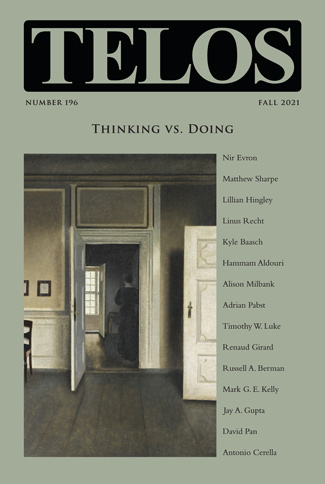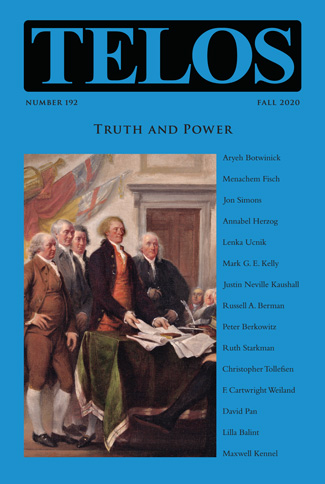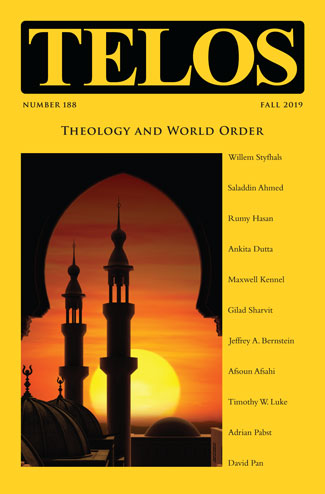By Telos Press · Thursday, December 9, 2021 In today’s episode of the Telos Press Podcast, David Pan talks with Nir Evron about his article “Hannah Arendt, Thinking, Metaphor,” from Telos 196 (Fall 2021). An excerpt of the article appears here. In their conversation they discussed how Arendt understands the difference between a metaphorical and a literal view of the world; her view of metaphor as a bridge between the thinking ego and the social and political world that it inhabits; the tension in Arendt’s The Life of the Mind between her desire to move beyond metaphysical assumptions and her unwillingness to let go of the philosophical tradition; the consequences for morality of her conception of metaphor; the impact of the Eichmann trial on Arendt and how it prompted her to explore the connection between thoughtlessness and evil; and her belief that the individual’s ability to think in a critical fashion might serve as a check on the descent into totalitarianism. If your university has an online subscription to Telos, you can read the full article at the Telos Online website. For non-subscribers, learn how your university can begin a subscription to Telos at our library recommendation page. Print copies of Telos 196 are available for purchase in our online store.
Listen to the podcast here.
Continue reading →
By David Pan · Monday, September 20, 2021 Telos 196 (Fall 2021): Thinking vs. Doing is now available for purchase in our store. Individual subscriptions to Telos are also available in both print and online formats.
 The dichotomy of thinking versus doing seems to arise out of our own sense of the difference between our minds and our bodies. On the one hand, the gap between mind and body is the basis of the perspective with which the mind can step back, criticize, and improve the world. Without this gap, we would be trapped in an eternal present, unable to imagine anything but what currently exists. On the other hand, the dichotomy can lead to a sense of detachment from the world. Such detachment can be negative if it leads to an isolation from the world, or to a sense of alienation if the world is such that its influence on the body becomes oppressive for the mind. The opposition between thinking and doing directs our attention toward this fundamental gap between the mind and the body within the human condition that is the source of both all human achievement as well as human debasement. As we focus on thinking, our detachment from our actions can allow us to make judgments about the wisdom of our actions, but such detachment can also lead us to bury ourselves in contemplation and ignore our responsibilities for acting, or even allow us to act with a kind of cruel coldness in trying to realize an abstract idea. This issue of Telos considers such different possibilities for the way in which we relate our thinking to our actions. The dichotomy of thinking versus doing seems to arise out of our own sense of the difference between our minds and our bodies. On the one hand, the gap between mind and body is the basis of the perspective with which the mind can step back, criticize, and improve the world. Without this gap, we would be trapped in an eternal present, unable to imagine anything but what currently exists. On the other hand, the dichotomy can lead to a sense of detachment from the world. Such detachment can be negative if it leads to an isolation from the world, or to a sense of alienation if the world is such that its influence on the body becomes oppressive for the mind. The opposition between thinking and doing directs our attention toward this fundamental gap between the mind and the body within the human condition that is the source of both all human achievement as well as human debasement. As we focus on thinking, our detachment from our actions can allow us to make judgments about the wisdom of our actions, but such detachment can also lead us to bury ourselves in contemplation and ignore our responsibilities for acting, or even allow us to act with a kind of cruel coldness in trying to realize an abstract idea. This issue of Telos considers such different possibilities for the way in which we relate our thinking to our actions.
Continue reading →
By Telos Press · Thursday, January 14, 2021 In today’s episode of the Telos Press Podcast, Camelia Raghinaru talks with Annabel Herzog about her article “When Arendt Said ‘We’: Jewish Identity in Hannah Arendt’s Thought,” from Telos 192 (Fall 2020). An excerpt of the article appears here. If your university has an online subscription to Telos, you can read the full article at the Telos Online website. For non-subscribers, learn how your university can begin a subscription to Telos at our library recommendation page. Purchase a print copy of Telos 192 in our online store.
Listen to the podcast here.
Continue reading →
By Telos Press · Thursday, January 7, 2021 In today’s episode of the Telos Press Podcast, Camelia Raghinaru talks with Lenka Ucnik about her article “Conscience, Morality, Judgment: The Bond between Thinking and Political Action in Hannah Arendt,” from Telos 192 (Fall 2020). An excerpt of the article appears here. If your university has an online subscription to Telos, you can read the full article at the Telos Online website. For non-subscribers, learn how your university can begin a subscription to Telos at our library recommendation page. Purchase a print copy of Telos 192 in our online store.
Listen to the podcast here.
Continue reading →
By David Pan · Friday, September 25, 2020 Telos 192 (Fall 2020): Truth and Power is now available for purchase in our store. Individual subscriptions to Telos are also available in both print and online formats.
 There is a strong temptation to oppose the idealism of truth to the realism of power in order to criticize and turn away from politics as a base pursuit. Science, facts, and ideals are cited as the objective truths that so often are ignored in favor of ideology, lies, and self-interest by those who wield power. Yet this opposition between truth and power can itself become a dubious tactic, as it is often the speaker who seeks to define an opinion as truth. This situation is complicated by the circumstance that there are three forms of truth that are often merged in such discussions. There is a strong temptation to oppose the idealism of truth to the realism of power in order to criticize and turn away from politics as a base pursuit. Science, facts, and ideals are cited as the objective truths that so often are ignored in favor of ideology, lies, and self-interest by those who wield power. Yet this opposition between truth and power can itself become a dubious tactic, as it is often the speaker who seeks to define an opinion as truth. This situation is complicated by the circumstance that there are three forms of truth that are often merged in such discussions.
First, there are natural scientific truths that even autocrats and totalitarians do not seek to deny, as they are the source of the technological tools that can support any attempt to maintain power. Here, there is certainly no conflict between truth and power. Not only does political power depend on technological achievement, but natural scientific facts cannot be covered up by lies and ideology for long. Consequently, political actors must pay attention to natural scientific and technical knowledge, even if they then instrumentalize it in different ways.
Continue reading →
By David Pan · Monday, September 9, 2019 Telos 188 (Fall 2019): Theology and World Order is now available for purchase in our store. Individual subscriptions to Telos are also available in both print and online formats.
 It would be naive to consider the question of global political order without engaging in debates about theology. Not only has it become clear that religious conflicts drive political ones, the very attempt to move “beyond” religion must be understood in terms of its theological meaning. The postsecular turn has not meant a return to religion so much as a realization that secularization was never a turn away from religion in the first place but rather itself a specific theological alternative among many. Accordingly, if our deepest political conflicts arise as consequences of theological disputes, we must address theology directly in order to get to the roots of major conflicts. Not only clear cases, such as conflicts between Israelis and Palestinians or between Shiite and Sunni Muslims, but also those between the United States and China revolve around theological issues that shape political and military conflict. Yet, our current approaches rely on political scientific and military calculations that have not yet been able to evaluate theology as a key and deciding factor in such conflicts. As the U.S. military and intelligence agencies debate the threat that Islamic State poses in Afghanistan, for instance, a key consideration should be the character and prospects of Islamic State’s theology, as well as the broader question of the role of theology in deciding political conflict. This issue of Telos engages in this discussion by considering how conceptions of world order arise from specific theologies. It would be naive to consider the question of global political order without engaging in debates about theology. Not only has it become clear that religious conflicts drive political ones, the very attempt to move “beyond” religion must be understood in terms of its theological meaning. The postsecular turn has not meant a return to religion so much as a realization that secularization was never a turn away from religion in the first place but rather itself a specific theological alternative among many. Accordingly, if our deepest political conflicts arise as consequences of theological disputes, we must address theology directly in order to get to the roots of major conflicts. Not only clear cases, such as conflicts between Israelis and Palestinians or between Shiite and Sunni Muslims, but also those between the United States and China revolve around theological issues that shape political and military conflict. Yet, our current approaches rely on political scientific and military calculations that have not yet been able to evaluate theology as a key and deciding factor in such conflicts. As the U.S. military and intelligence agencies debate the threat that Islamic State poses in Afghanistan, for instance, a key consideration should be the character and prospects of Islamic State’s theology, as well as the broader question of the role of theology in deciding political conflict. This issue of Telos engages in this discussion by considering how conceptions of world order arise from specific theologies.
Continue reading →
|
|










